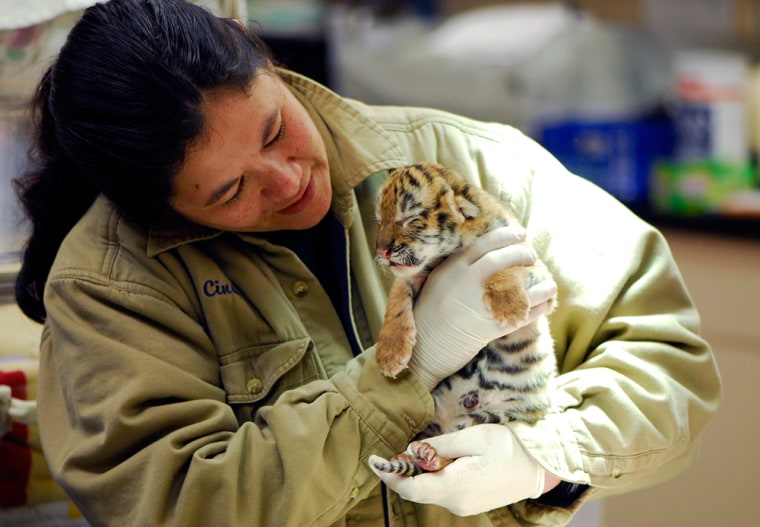A rare Amur tiger is rejecting her Mother's Day present, a seemingly healthy cub born on the day.
The mother who appears indifferent to her cub is now being given a drug to spur milk production in hopes she will begin to care for the little one, the head of the Pittsburgh Zoo & PPG Aquarium said Wednesday.
Examinations on Wednesday turned up no immediate evidence of any illness in the mother named Toma or in the cub, which was born Sunday, said Dr. Barbara Baker, a veterinarian who is the zoo's president and chief executive officer.
Zoo officials are concerned Toma has stopped nursing the cub, but Baker said the mother's below-normal milk production might be causing her indifference toward the newborn.
The cub, which hasn't been named and is called Baby Tiger by the zoo, is being bottle-fed. If the drug doesn't improve Toma's milk production and spur her maternal instincts, it will stay on the bottle. Tiger cubs have been successfully raised that way, though the zoo prefers its animals to raise their own young, Baker said.
Tiger cubs have also been adopted by unlikely surrogate mothers. A pig at a Chinese zoo cared for three cubs, who played nice with their step brother and sister piglets. Another rejected tiger cub trio, also at a Chinese zoo, were nursed by a dog.
Amur, or Siberian tigers, are endangered. There are only about 400 in the wild and 200 at accredited zoos, Baker said.
Is something wrong with the cub?
Baker cautioned that Toma's instincts might be a sign that the cub has an unseen defect.
"She might sense or know something we don't know," Baker said. "There might be something the cub was born with and she was able to sense that this cub is not going to survive, so she's not going to take care of it."
Tiger cubs are typically weaned after about six to eight weeks, Baker said.
Toma's behavior is more puzzling because she exhibited proper maternal instincts when she gave birth two years ago to a litter of three, Baker said.
One of those cubs died five weeks later of birth defects. The other two cubs matured normally and are on display at the zoo.
There's no sign that Toma's newest cub has any birth defects, but the one that died two years ago did not immediately show signs of a problem either, Baker said.
Zoo officials would hope to see a difference in Toma's maternal instincts within a day or two.
